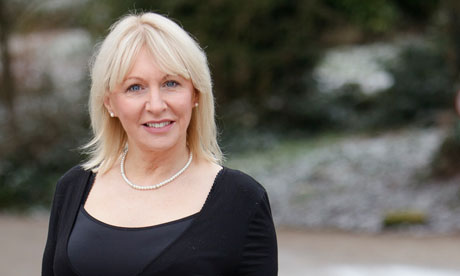Why is the abstinence-for-girls MP invited to incite moral panic about children on daytime television?

Nadine Dorries, the MP for Mid Bedfordshire, appeared on The Vanessa Show to discuss her views on abstinence-based sex education for girls.
Tucked away on daytime TV on Monday afternoon, Nadine Dorries was justifying her proposals for elements of abstinence-based sex education for girls. The Vanessa Show saw the Conservative MP go head to head with Julie Bentley, chief executive of the sexual health charity FPA. The women, along with presenter Vanessa Feltz and retired rugby player Lawrence Dallaglio, discussed the bill that was unveiled to the House of Commons two weeks ago. When it was first introduced, Dorries insisted her aim was to empower teenage girls to say "no" to sex. There is really nothing empowering about teaching young women that their sexuality is not their own. Abstinence-based sex education teaches girls that sex isn't something that they participate in – instead, it's something they give in to. Towards the end of the debate, Dorries said:
"A lot of girls, when sex abuse takes place, don't realise until later that that was a wrong thing to do … Society is so over-sexualised that I don't think people realise that if we did empower this message into girls, imbued this message in schools, we'd probably have less sex abuse."This argument risks blaming the victim, is dangerous and has no place in sex education or mainstream discourse. Her comments situate girls as the gatekeepers of sexual morality, and could make sexual abuse victims feel chastised with a message that maintains that the abuse is easy to end by saying "no". Ignorance paired with influence is a lethal combination. While it's easy to dismiss her nonsense as fact-lacking populism, her words are gaining support. Listen closely to Dorries's comments and you'll notice that what she expresses as care and concern is actually old-fashioned shaming and blaming. She says that it is "girls who lose their education, girls that go on benefits, girls who usually throw in the towel and spend a lifetime on benefits, girls who enter old age in poverty, girls who usually end up with a row of guesting fathers and more babies because they can't get back into education". Heteronormativity in her discourse is nothing new, but why does she only talk about females being sexually abused by males, and not mention male victims of sexual abuse at all? By placing emphasis on the victims' potential to halt abuse, she distracts from the abusers' responsibility. Her comments are cruel and flawed. Dorries is right in some respects. Pop culture has a nasty habit of packaging up perceptions of sexuality and selling it back to us. But the word "sexualised" does little to encompass this. If anything, teenagers need to be fully informed about sex so that they can make their own decisions – not ones influenced by MTV, or by misguided MPs in parliament. What is worrying is the misleading information. During her diatribe she referenced leaflets from the Sheffield NHS Trust aimed at 11-year-olds in schools, with the heading "an orgasm a day keeps the doctor away". In fact, the headline appeared in an advice booklet to help adults working with teenagers aged 14 and over. She also perpetuates the myth that from the age of seven, children are taught the art of applying condoms to bananas. Sex educator Alice Hoyle disputes Dorries's claims, saying: "I've never known it to happen in primary schools, and neither have any of my colleagues. It would be unusual and unlikely for this to happen in primary schools, and I would be incredibly surprised if any preteens had even had one condom demonstration by the age of 13". Dorries cites no sources and she releases no evidence, yet she is invited on daytime television to incite moral panic about children. A post on her blog confirms she was pleased with her appearance, but the ideas she is spreading are dangerous. It is unbelievable that an elected representative can make these kinds of unsubstantiated claims in parliament, and even more unbelievable that her original 10-minute bill passed by a majority of six in the Commons. With Dorries doing the rounds on daytime television chat shows, it appears that she is attempting to drum up support to pile public pressure on to politicians in time for the bill's second reading in January.
No comments:
Post a Comment